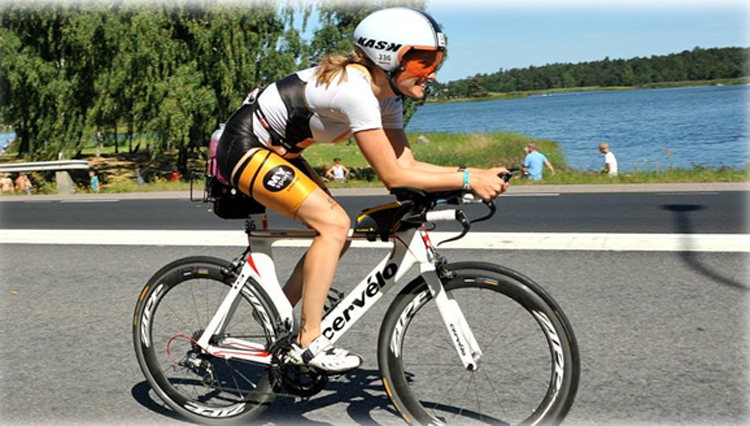Esther Haller got 10 years ago via a friend and without much knowledge to the triathlon. Ever since, the virus has not let her go again – six years ago, she has completed her first Olympic triathlon. She celebrated her biggest success at the IRONMAN in Kalmar/Sweden last year, where she won in her age category with a time of less than 10 hours. A similar result at the <link www.ironman.ch - external-link "Opens external link in current window">home IRONMAN Zurich</link> could possibly lead to the start permission for the <link eu.ironman.com/triathlon/events/americas/ironman/world-championship.aspx - external-link "Opens external link in current window">competition on Hawaii</link>. During the races, a myclimate cloud will also find his way on Esther’s competition outfit.
Esther, why is climate protection of high importance for you?
“Our planet is our home, our only home. Where should we go to, when we destroy it.” This quotation of the Dalai Lama expresses what significance the climate protection has: A very, very big one. I think that with the continuous increase of the earth population, the sustainability should have a greater significance in our everyday life. When facing world nutrition or global warming, the mankind has some challenges which, in my opinion, have to be tackled in an effective and reasonable way. I deliberately say “the mankind” as every single person is jointly responsible for the sustainability on earth and therefore for the protection of our climate.
John F. Kennedy once said: “Ask not what your planet can do for you, ask what you can do for your planet”. I try to contribute with small details in my daily routine: e.g. buying regional food, recycling, riding a bicycle instead of using the car for short distances. Nevertheless, I have some troubles, as many others do so, aligning my whole life with climate protection. I love to travel and I have to take the plane for long distances. I know how harmful this is to the earth. This is the reason why I support organizations such as myclimate in order to make a responsible contribution.
How can a conscious lifestyle be compatible with professional sport and its necessities such as international competitions?
As mentioned above, I try to contribute with small details to climate protection. A big part, which plays a role in my daily professional routine, is the choice of food. I do not consume much meat and if I do so, then only Swiss meat. I only eat fish up to a maximum of once a week. With oil, I make sure that the oil is from Europe (e.g. Swiss rape oil, olive oil from Italy). Neither do I take part in every “super food trend” (Açaí beeries from the Amazonas area and so on) as there are usually comparable alternatives from the region.
This year, I have deliberately chosen competitions which are close so that I do not have to travel to the competition’s location. However, I had to fly twice to a trainings camp which is my winter training camp and therefore essential for my trainings plan. Hence, I consider the compensation of flights – one of the many offers of myclimate – a good thing. Especially as I know that not only the climate benefits from this compensation but also many local people at the same time.
What are your goals for the upcoming competition and what would a participation permission for Hawaii mean to you?
My goal is to be able to train with lots of fun and free of injuries until the coming IRONMAN Zurich. I want to be 150% ready forthis competition, both mentally and physically, in order to be able to enjoy the competition apart from the effort. I want to cross the finish line and be able to say: “I have put in everything and am satisfied with myself and my performance.” If that should result in a podium position, I would be very happy.
If I qualified for the world championship in Kona / Hawaii, I would find myself caught up in a dilemma. Just because I do not know, if that is what I really want to do.It is important for me to be able to do Triathlon with a lot of fun and not too grimy. Hawaii would mean to train very hard again, taking a long journey as well as costs in the four-digit range. But, on the other side, it would be a valuable experience which I probably would never forget anymore.
How do you motivate yourself? Duringyour training sessions or when facing critical competition situations?
In order to be able to cope with the huge training effort apart from the work and the professional development, I need a goal. This has been set with the IRONMAN Zurich. Apart from the goal, which I focus on intensely, the passion which I have for the sport plays an important role. The sport gives me a lot and it is an ideal balance to my job. Furthermore, I am every day very thankful to have two priceless privileges: My health and the opportunity to do Triathlon.
On the 24th of July, Esther Haller and many other athletes from more than 60 countries will start at the climate neutral as it already had been in the previous year. The organizers are compensating all emissions generated from the competition with the myclimate project <link www.myclimate.org/carbon-offset-projects/projekt/nicaragua-forestry-7186/ - external-link "Opens external link in current window">“Community Reforestation in Nicaragua”</link>.
myclimate wishes all athletes and especially Esther Haller the best of luck and success.
